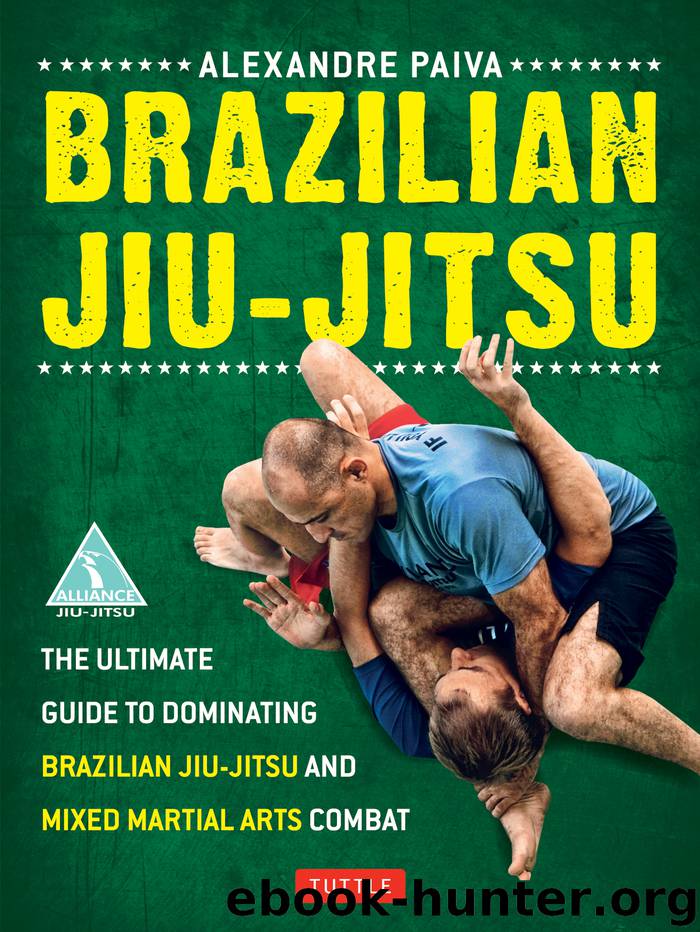Brazilian Jiu-Jitsu by Alexandre Paiva

Author:Alexandre Paiva
Language: eng
Format: epub
ISBN: 978-1-4629-1000-7
Publisher: Tuttle Publishing
Jiu-jitsu
Jiu-Jitsu techniques can be characterized by a reasoning process similar to the one found in the game of chess. In both activities, all actions are defined by logic, tactics and strategy.
Your path in Jiu-Jitsu can be compared to attempting to solve a puzzle. At the beginning, we are given a few elements that are easy enough to figure out. As soon as we solve the easy ones, however, we are facing a more complicated puzzle, with more elements to piece together. It is hard to imagine how many techniques are possible, how many techniques can be created. The variety of techniques can encourage one to not only know possitions, but to also try to understand the mechanics of movement.
The logic, tactics, and strategy in techniques must be built on the knowledge of anatomy. One must know body parts, structure, mechanics, and all kinds of limitations — the limitations of the range of motion needed to execute sprains and needed to perform chokes. Based of this sort of knowledge, one can learn how to use locks and pins to force the opponent into submission. This is a close contact fight, body to body. Both fighters need to set their own strategy and tactics of attack, but they also have to understand and anticipate the opponent’s moves and possible actions in order to counteract.
Playing chess and practicing Jiu-Jitsu demand exercising the anticipation of the opponent’s moves. Thus, playing chess might bring advantages for the Jiu-Jitsu student and can be a part of the learning process.
Beside its physical side, Jiu-Jitsu has also a moral and ethical context, which also gives students training in moral aspects. When practicing with a sense of proportion and respect for the opponent, Jiu-Jitsu is very positive and moral. Practicing with others allows one to develop friendships and to bond with other people. The social aspect keeps the student coming back, continuing to practice and — finally — achieving new skills. Jiu-Jitsu is a wonderful way to educate a person and allow them to develop social tools.
Without doubt, Jiu-Jitsu is an effective martial art. It has been proved as such in comparison with others martial techniques, and included in the training routines of those who fight the most brutal combat: World Vale Tudo Championship (WVC), Ultimate Fighting Championship (UFC), and Pride Fighting Championships (Pride FC). Being aware of Jiu-Jitsu’s advantages and effectiveness helps students to develop self-confidence and self-esteem.
Technical development in Jiu-Jitsu depends on the way one maintains discipline in many aspects of daily life, such as a healthy diet, a regular schedule, etc. This discipline is another way of saying self-control.
The practice of martial arts is also a great life lesson which will prepare students to face their surrounding reality by teaching them about their limitations, increasing their self-esteem and confidence, and improving their motor skills. Practicing a martial art teaches one to respect one’s friend and opponents, to handle both victory and failure.
If only we choose, we can live our dream life and achieve everything we want, instead of watching as time passes by.
Download
This site does not store any files on its server. We only index and link to content provided by other sites. Please contact the content providers to delete copyright contents if any and email us, we'll remove relevant links or contents immediately.
Shoe Dog by Phil Knight(4167)
The Rules Do Not Apply by Ariel Levy(3905)
Walking by Henry David Thoreau(3234)
Running Barefoot by Amy Harmon(3056)
Crazy Is My Superpower by A.J. Mendez Brooks(2860)
How to Read Water: Clues and Patterns from Puddles to the Sea (Natural Navigation) by Tristan Gooley(2854)
I'll Give You the Sun by Jandy Nelson(2842)
How to Read Nature by Tristan Gooley(2665)
How Music Works by David Byrne(2525)
The Boy, the Mole, the Fox and the Horse by Charlie Mackesy(2447)
Seducing Cinderella by Gina L. Maxwell(2235)
Cuba by Lonely Planet(2184)
The Fight by Norman Mailer(2158)
Going Long by Editors of Runner's World(1920)
Accepted by Pat Patterson(1917)
The Unfettered Mind: Writings from a Zen Master to a Master Swordsman by Takuan Soho(1859)
The Happy Runner by David Roche(1821)
Backpacker the Complete Guide to Backpacking by Backpacker Magazine(1815)
Trail Magic by Trevelyan Quest Edwards & Hazel Edwards(1760)
